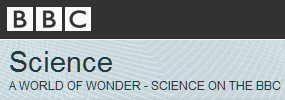|
|
|
|
|
|
|
News & Views item - July 2011 |
![]() A Review of BBC Impartiality and Accuracy of Science Coverage. (July 21,
2011)
A Review of BBC Impartiality and Accuracy of Science Coverage. (July 21,
2011)
 Over
a year ago the BBC Trust commissioned an independent report from Steve Jones,
Emeritus Professor of Genetics at University College London, together with
content analysis from the Science Communication Group at Imperial College London
to review the accuracy and impartiality of BBC science coverage.
Over
a year ago the BBC Trust commissioned an independent report from Steve Jones,
Emeritus Professor of Genetics at University College London, together with
content analysis from the Science Communication Group at Imperial College London
to review the accuracy and impartiality of BBC science coverage.
The
100-page report![]() released yesterday finds that while there are certain "shortcomings
in its coverage including a lack of contact and cooperation between science
programme makers across BBC divisions; an over-reliance on a narrow range of
external information sources; and, crucially, concern about the appropriate
application of editorial guidelines on 'due impartiality' in science coverage,
[the broadcaster's] content in this area is generally of a high quality. In
particular, it is judged to be a thriving and improving genre of programming,
which is well established across a wide range of BBC services. It is also
described as 'exemplary' by Professor Jones in its precision and clarity".
released yesterday finds that while there are certain "shortcomings
in its coverage including a lack of contact and cooperation between science
programme makers across BBC divisions; an over-reliance on a narrow range of
external information sources; and, crucially, concern about the appropriate
application of editorial guidelines on 'due impartiality' in science coverage,
[the broadcaster's] content in this area is generally of a high quality. In
particular, it is judged to be a thriving and improving genre of programming,
which is well established across a wide range of BBC services. It is also
described as 'exemplary' by Professor Jones in its precision and clarity".
Professor Jones working with ICL's Science Communications Group spent eight weeks analysing the BBC's radio, TV and online science coverage as well as getting opinions from scientists, reporters, and communications experts.
The Trust's report notes that Professor Jones believes that there is room
for improvement and sets out some areas of concern and associated
recommendations.
The most significant of these are:
An at times “over-rigid” (as Professor Jones describes it) application of the Editorial Guidelines on impartiality in relation to science coverage, which fails to take into account what he regards as the “non-contentious” nature of some stories and the need to avoid giving “undue attention to marginal opinion”. Professor Jones cites past coverage of claims about the safety of the MMR vaccine and more recent coverage of claims about the safety of GM crops and the existence of man made climate change as examples on this point. He suggests that achieving “equality of voice” may be resolved by the new 2010 Editorial Guidelines which incorporate consideration of “due weight” in relation to impartiality. A more common-sense approach to “due impartiality” would also help, he believes.
Underdeveloped links between science programme makers across the BBC’s divisions. This he recommends might in part be addressed by establishing a regular cross-division science forum and appointing a Science Editor for BBC News to work across a range of output.
Too narrow a range of sources for stories and a tendency to be reactive rather than proactive, particularly in news coverage. Professor Jones recommends that this might be remedied by better use of external electronic databases that draw from a wide variety of science publications. He further recommends working to improve – and share – BBC contacts with the science community.
In response the BBC's Executive has made six proposals:
We propose to appoint a Science Editor for BBC News, rather than [as Professor Jones recommended] for the whole of the BBC.
We accept the proposal to create a pan-BBC science forum to exchange information on science coverage.
We recognise the need to develop a greater variety of sources of information by reviewing our current use of databases, subject to considering the cost of any changes.
We will set in place measures to create a ‘new engagement’ with scientists as Professor Jones calls it.
We propose to take two specific measures to improve our journalists’ understanding of impartiality in science and the way items should be presented.
The College of Journalism will establish an online training module for staff on this specific topic with input from BBC editorial policy.
The College will run two seminars in 2011/12 with a selected panel of scientists to debate current issues and their coverage in the media.
Robert Ward, policy and communications director at the Grantham Research Institute on Climate Change and the Environment at the London School of Economics and Political Science told Sara Reardon of ScienceInsider that he "concurs with Jones's assessment, contending that BBC political or economic reporters often fail to take sources to task for misrepresenting, for instance, the amount of money climate change policies would add to fuel bills. 'I think BBC needs to recognize that they're falling short and … improve that,'" and while he believes that sceptics of a scientific consensus shouldn't be banned from media coverage, or their views and ideas not reported, [nevertheless]... the reasons for [including them] should be driven by what's in the public interest. It's not about being fair to the person you interview, it's about giving the public a true and accurate story. 'Unlike art or humanities, where opinions are taken into account, that doesn't apply to everything in science: some things are demonstrably false.'"